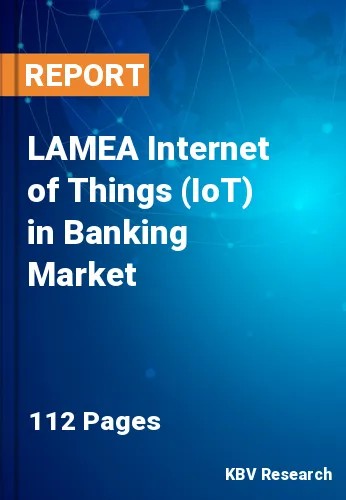Chapter 1. Market Scope & Methodology
1.1 Market Definition
1.2 Objectives
1.3 Market Scope
1.4 Segmentation
1.4.1 LAMEA Internet of Things (IoT) in Banking Market, by Offering
1.4.2 LAMEA Internet of Things (IoT) in Banking Market, by Deployment Model
1.4.3 LAMEA Internet of Things (IoT) in Banking Market, by Enterprise Size
1.4.4 LAMEA Internet of Things (IoT) in Banking Market, by Application
1.4.5 LAMEA Internet of Things (IoT) in Banking Market, by Country
1.5 Methodology for the research
Chapter 2. Market Overview
2.1 Introduction
2.1.1 Overview
2.1.1.1 Market Composition and Scenario
2.2 Key Factors Impacting the Market
2.2.1 Market Drivers
2.2.2 Market Restraints
Chapter 3. Competition Analysis – Global
3.1 Market Share Analysis, 2021
3.2 Strategies deployed in Internet of Things (IoT) in Banking Market
Chapter 4. LAMEA Internet of Things (IoT) in Banking Market by Offering
4.1 LAMEA Solution Market by Country
4.2 LAMEA Services Market by Country
Chapter 5. LAMEA Internet of Things (IoT) in Banking Market by Deployment Model
5.1 LAMEA On-premise Market by Country
5.2 LAMEA Cloud Market by Country
Chapter 6. LAMEA Internet of Things (IoT) in Banking Market by Enterprise Size
6.1 LAMEA Large Enterprises Market by Country
6.2 LAMEA SMEs Market by Country
Chapter 7. LAMEA Internet of Things (IoT) in Banking Market by Application
7.1 LAMEA Smart ATMs Market by Country
7.2 LAMEA Customer Management & Support Market by Country
7.3 LAMEA Security & Authentication Market by Country
7.4 LAMEA Others Market by Country
Chapter 8. LAMEA Internet of Things (IoT) in Banking Market by Country
8.1 Brazil Internet of Things (IoT) in Banking Market
8.1.1 Brazil Internet of Things (IoT) in Banking Market by Offering
8.1.2 Brazil Internet of Things (IoT) in Banking Market by Deployment Model
8.1.3 Brazil Internet of Things (IoT) in Banking Market by Enterprise Size
8.1.4 Brazil Internet of Things (IoT) in Banking Market by Application
8.2 Argentina Internet of Things (IoT) in Banking Market
8.2.1 Argentina Internet of Things (IoT) in Banking Market by Offering
8.2.2 Argentina Internet of Things (IoT) in Banking Market by Deployment Model
8.2.3 Argentina Internet of Things (IoT) in Banking Market by Enterprise Size
8.2.4 Argentina Internet of Things (IoT) in Banking Market by Application
8.3 UAE Internet of Things (IoT) in Banking Market
8.3.1 UAE Internet of Things (IoT) in Banking Market by Offering
8.3.2 UAE Internet of Things (IoT) in Banking Market by Deployment Model
8.3.3 UAE Internet of Things (IoT) in Banking Market by Enterprise Size
8.3.4 UAE Internet of Things (IoT) in Banking Market by Application
8.4 Saudi Arabia Internet of Things (IoT) in Banking Market
8.4.1 Saudi Arabia Internet of Things (IoT) in Banking Market by Offering
8.4.2 Saudi Arabia Internet of Things (IoT) in Banking Market by Deployment Model
8.4.3 Saudi Arabia Internet of Things (IoT) in Banking Market by Enterprise Size
8.4.4 Saudi Arabia Internet of Things (IoT) in Banking Market by Application
8.5 South Africa Internet of Things (IoT) in Banking Market
8.5.1 South Africa Internet of Things (IoT) in Banking Market by Offering
8.5.2 South Africa Internet of Things (IoT) in Banking Market by Deployment Model
8.5.3 South Africa Internet of Things (IoT) in Banking Market by Enterprise Size
8.5.4 South Africa Internet of Things (IoT) in Banking Market by Application
8.6 Nigeria Internet of Things (IoT) in Banking Market
8.6.1 Nigeria Internet of Things (IoT) in Banking Market by Offering
8.6.2 Nigeria Internet of Things (IoT) in Banking Market by Deployment Model
8.6.3 Nigeria Internet of Things (IoT) in Banking Market by Enterprise Size
8.6.4 Nigeria Internet of Things (IoT) in Banking Market by Application
8.7 Rest of LAMEA Internet of Things (IoT) in Banking Market
8.7.1 Rest of LAMEA Internet of Things (IoT) in Banking Market by Offering
8.7.2 Rest of LAMEA Internet of Things (IoT) in Banking Market by Deployment Model
8.7.3 Rest of LAMEA Internet of Things (IoT) in Banking Market by Enterprise Size
8.7.4 Rest of LAMEA Internet of Things (IoT) in Banking Market by Application
Chapter 9. Company Profiles
9.1 Microsoft Corporation
9.1.1 Company Overview
9.1.2 Financial Analysis
9.1.3 Segmental and Regional Analysis
9.1.4 Research & Development Expenses
9.1.5 Recent strategies and developments:
9.1.5.1 Acquisition and Mergers:
9.1.6 SWOT Analysis
9.2 IBM Corporation
9.2.1 Company Overview
9.2.2 Financial Analysis
9.2.3 Regional & Segmental Analysis
9.2.4 Research & Development Expenses
9.2.5 SWOT Analysis
9.3 SAP SE
9.3.1 Company Overview
9.3.2 Financial Analysis
9.3.3 Segmental and Regional Analysis
9.3.4 Research & Development Expense
9.3.5 Recent strategies and developments:
9.3.5.1 Partnerships, Collaborations, and Agreements:
9.3.5.2 Acquisition and Mergers:
9.3.6 SWOT Analysis
9.4 Oracle Corporation
9.4.1 Company Overview
9.4.2 Financial Analysis
9.4.3 Segmental and Regional Analysis
9.4.4 Research & Development Expense
9.4.5 SWOT Analysis
9.5 Cisco Systems, Inc.
9.5.1 Company Overview
9.5.2 Financial Analysis
9.5.3 Regional Analysis
9.5.4 Research & Development Expense
9.5.5 Recent strategies and developments:
9.5.5.1 Acquisition and Mergers:
9.5.6 SWOT Analysis
9.6 Accenture PLC
9.6.1 Company Overview
9.6.2 Financial Analysis
9.6.3 Regional Analysis
9.6.4 Research & Development Expense
9.6.5 Recent strategies and developments:
9.6.5.1 Acquisition and Mergers:
9.6.6 SWOT Analysis
9.7 Infosys Limited
9.7.1 Company Overview
9.7.2 Financial Analysis
9.7.3 Segmental and Regional Analysis
9.7.4 Research & Development Expense
9.7.5 Recent strategies and developments:
9.7.5.1 Acquisition and Mergers:
9.7.6 SWOT Analysis
9.8 Capgemini SE
9.8.1 Company Overview
9.8.2 Financial Analysis
9.8.3 Regional Analysis
9.8.4 Recent strategies and developments:
9.8.4.1 Acquisition and Mergers:
9.9 Software AG
9.9.1 Company Overview
9.9.2 Financial Analysis
9.9.3 Segmental and Regional Analysis
9.9.4 Research & Development Expense
9.9.5 Recent strategies and developments:
9.9.5.1 Acquisition and Mergers:
9.10. Vodafone Group Plc
9.10.1 Company Overview
9.10.2 Financial Analysis
9.10.3 Regional & Segmental Analysis

